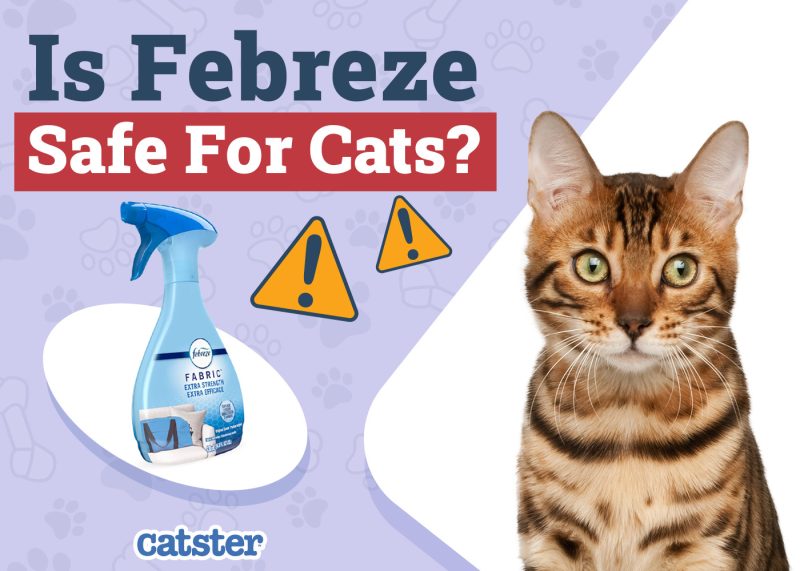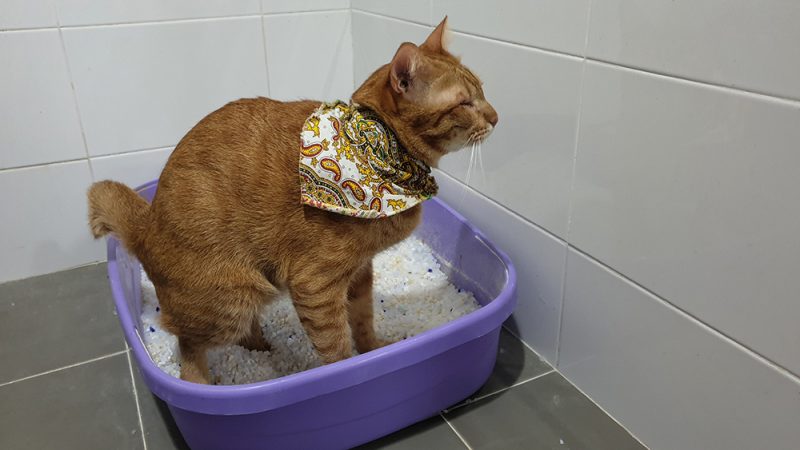In this article
However, not all owners enjoy such a close relationship with their cats.
Whether you have recently adopted an adult cat, or your cat has seemingly changed and become quite aggressive, living with a cat that scares you can be an awful experience. What’s worse is that if you show your cat that you’re afraid, it can increase anxiety levels and exacerbate the problem.
Below are tips and tricks to help you deal with your feline fear.

The 10 Tips & Tricks on What to Do When You’re Scared of Your Own Cat
1. Rule Out Illness in Your Cat

The most common reason that owners are scared of their cats is that their previously placid cat has become aggressive or shows aggressive tendencies. There are various possible causes of this change in character, but you should start by eliminating the possibility of illness or injury.
If your cat suddenly feels unwell or in pain, they might be acting more aggressively as a means of defending themselves. In the wild, a sick or injured cat is seriously prone to attack from predators, so as well as hiding their illness, they would become aggressive to mask their weakness.
Look for obvious signs of physical injury but try not to stress the cat out any further, or you could make matters worse. Also consider whether there are any other signs of illness, such as lethargy or a change in eating or toileting habits.
Have a vet check over your cat so they can either identify illnesses or rule this possibility out.
If you need to speak with a vet but can't get to one, head over to PangoVet. It's an online service where you can talk to a vet online and get the advice you need for your pet — all at an affordable price!

2. Identify the Cause of Aggressive Behavior
If your cat isn’t ill but has undergone a change in character and mood, there might be another cause. Cats are especially susceptible to a change in circumstances or environment, so if you have moved house, welcomed a new addition to the family, or put the cat through any other major life changes recently, this could be the cause of their newfound aggression.
Knowing the cause can help you make allowances or some minor adjustments to help your cat come to terms with those changes. For example, you might need to start introductions with a new pet again and take things even slower.
3. Try Natural Calming Products
You can buy herbal and natural calming products, as well as pheromone-based products. These can make an enormous difference if your cat’s behavior change is based on stress or anxiety. It may even be worth using a combination of pheromone and non-pheromone products to maximize the effects.
4. Spend Time Together

If you are scared of your cat, your first instinct might be to stay as far away as possible, as much as possible. But this isn’t good for you, your cat, or your relationship. Your cat may need to learn to trust you again, and they can’t do this if you are always in a different room.
You don’t have to approach or try to fuss or stroke your cat, but you do need to spend time in the same room. When you’re in the room, try talking gently and reassuringly to the cat. Keep repeating the process, spending as much time in the vicinity of your feline friend as possible.
5. Get Them a Friend
Your cat may not be being aggressive—they could simply be bored. Boredom leads to unwanted behaviors in cats, just as it does in dogs, and one of these unwanted behaviors could be attacking your feet or your hands. Your cat sees it as entertaining, and if you react, then they are also getting attention.
If you are dealing with a young cat who is constantly ambushing you from around corners or behind doors, they may benefit from another youthful feline for company. Young cats and kittens will run, jump, play, and fight together, and cats that haven’t had enough of this socialization will often not understand how much is too much when it comes to rough play. Talk to your vet or local animal shelter about whether they would recommend this for your situation.
6. Provide Toys
Another way to prevent boredom is to provide enrichment for your cat. Items like scratching posts and climbing trees allow your cat to exercise some of their natural instincts. They will provide physical exercise and offer mental stimulation.
Buy cat toys and try to find a way to play with your cat with those toys. If you’re worried about getting your fingers or hands scratched, consider wand or string toys. You can play while in the vicinity of your cat, which should help build a bond between you both, without you having to be directly in the firing line.
7. Tire Them Out

As well as mental stimulation, cats need physical exercise. Indoor cats especially miss out on the chance to run, climb, and enjoy other physical activities. Scratching posts and climbing trees offer some physical exercise. Alternatively, buy a leash and collar and walk your cat.
There are also cat exercise wheels, which are similar to the wheels that we provide to hamsters and other small animals, but that are designed specifically for our feline friends.
8. Don’t Yell or Scold Your Cat
Yelling at your cat will only cause more anxiety. In extreme cases, it could cause your cat to attack you, but will, at the very least, cause them to hide from you. If your cat hides from you, it will make your relationship very difficult to fix. If they are trying to scratch or bite, stand up and walk away. If you need to stop them, try a short, sharp, hissing noise – it is less threatening and more likely to get their attention.
9. Don’t Punish Them
You should never physically punish your cat. Not only are you much bigger and stronger than your cat and therefore have the potential to cause serious harm, but it will cause anxiety and it can make any behavioral issues far worse than they already are.
10. Don’t Act Scared

If your cat is being aggressive because they want you to leave them alone, acting scared is a big mistake. Your cat will recognize that it has the upper hand and is, effectively, winning. It is getting the desired result by being aggressive so will continue to be aggressive with you in the hope of continuing to get that result.
It might be difficult, but you need to ignore any aggressive behavior, attempt to distract the cat with toys or other items, and spend time with them.

Frequently Asked Questions
Do Cats Know If You Are Scared of Them?
Cats can recognize facial expressions and they notice your behavior and how you act and react to certain situations. Not only does your cat recognize when you are scared, but they quickly learn to repeat any actions that get the desired result. So, if your cat is being aggressive because it wants you to leave it alone, and you leave the room, it will continue to be aggressive with you next time.
Should I Tempt My Aggressive Cat With Treats?
Treats should only ever be used to reward good or desired behavior. It might seem like a good idea to distract your cat with some of their favorite food, but all that will achieve is teaching them that this behavior earns them a treat.
Instead, offer your feline their favorite foods when they are being calm and settled in your presence. This will help them to associate more sociable behavior with a reward. Place the treat in front of them instead of allowing them to take it from your hand. They need to learn that fingers are not for biting!

Why Has My Cat Suddenly Turned Aggressive?
There are many reasons why an otherwise placid cat turns aggressive. Rule out illness by visiting the vet, and injury by physically checking for any signs. If you have made any major changes to your cat’s environment or living conditions, look for ways to mitigate these changes or to get your cat accustomed to those changes. Even something as seemingly simple as a change in diet could be the cause. Even if your cat lives indoors, take a look at what’s happening outside. If there are any dogs, cats, or other beasties spending time outside your windows, this could cause your cat to feel stressed and defensive.

Conclusion
Cats are sensitive animals and there could be any number of reasons for a change in behavior. Consider any recent upheavals, additions, or events that might have triggered these changes, or, if your cat is new to you and showing signs of aggression, look for ways to bond.
Spend time near your cat, talking to them in a calm manner and playing with toys that you can keep at arm’s length. Ensure they are introduced to other members of your pet family gradually and sympathetically, too, and don’t yell, scold, or physically punish your cat for unwanted behaviors.
Walk away calmly from inappropriate behavior, and resist the urge to shout at or punish your cat; this will only make matters worse. Talk to your vet about the situation, as the earlier you address the problem, the greater the chances of success.
Featured Image Credit: Koldunov, Shutterstock





















4 Responses
hi, i adopted a cat in sept..but until now my cat never allow me to pet him. i am scared of cats so how can i start to pet him? i read a lot, and most people said need to wait until cat making his move towards us. And some said to just touch him but i am scared if he would scratch me if i continue touch him.
Hi fasha, thanks for reading us. We think you might find the following post helpful:
Where Do Cats Like to Be Pet?- https://www.catster.com/lifestyle/where-do-cats-like-to-be-pet/
How to Pet Your Cat & Find Special Places They Love – https://www.catster.com/lifestyle/how-to-pet-your-cat/
Also please note that if the cat you adopted is a feral, you will likely never be able to pet him, ferals are considered wild animals. You can learn more about this here:
How to Tell If a Cat Is Feral: 7 Questions to Ask Yourself- https://www.catster.com/lifestyle/how-to-tell-if-a-cat-is-feral/
Can Feral Cats Be Friendly? – https://www.catster.com/cat-behavior/can-feral-cats-be-friendly/
Best wishes, we hope this helps
About a week ago my cat was sitting on my lap and got spooked, jumped off and about a minute later came back in the room jumped on top of me and attacked me and now I’m afraid to let him back on my lap. What should I do?
Hi Judie, sorry to hear about your situation. It is always important to try to identify the triggers. If you can find out what was scaring him, you can ensure to avoid it next time he sits on your lap. You will need to let some time pass for you to feel a little bit more calm and secure. When you feel ready, you can start reintroducing lap time in small increments. Have some treats on hand to offer to your cat for calm behavior and put him back down after this, offer a fun alternative like playing with a toy. You can slowly work on increasing the time. Like in any other relationship, rebuilding trust is a slow process, and this goes both ways.